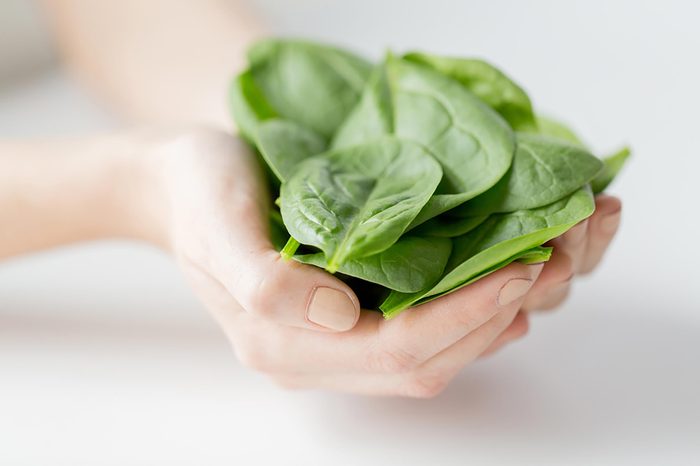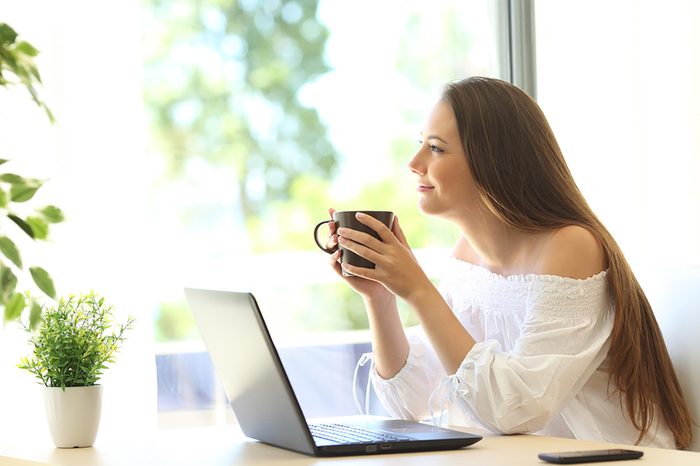What is computer vision syndrome (CVS)?
Blurry vision? Tired eyes? Strained neck? Headaches? If you’re experiencing any or all of the above symptoms, you might have computer vision syndrome (CVS). Yes, it’s a real thing. When you stare at computers (or devices like smartphones and tablets) for too long, the muscles in your eyes have to work overtime. And “like any muscle, if you’re constantly using it, it can break down,” says James Stringham, PhD, a research professor at the University of Georgia. In fact, CVS (also called digital eye strain) affects around 60 million people around the world, according to a report in BMC Research Notes. And in this day and age, many jobs involve at least some computer work. What to do? Luckily, research shows that changing just a few daily habits can reduce your risk for computer screen eye strain and improve your eyesight, pronto.

Eat leafy greens
Chowing down on leafy greens like spinach, kale, and broccoli isn’t just a vitamin A fix; it may reduce your risk for digital eye strain too. Researchers found that special nutrients in leafy green vegetables, also called lutein and zeaxanthin, not only have exceptional antioxidant and anti-inflammatory powers, but they are also found in high concentrations at the backs of our eyes, protecting them from glare and bright lights—including from digital screens, per the Annual Review of Nutrition. “The American diet being the way that it is, we don’t get too much in the way of leafy green vegetables,” Dr. Stringham says. Check out other reasons why you might have eye strain.

Practice the 20-20-20 rule
While a simple solution to computer vision syndrome might be to reduce the amount of time we spend looking at digital screens, “that’s not an option for most of us when our jobs and our productivity is depending on being on a computer,” Dr. Stringham says. Instead, if your eyes start feeling tired or strained while you’re staring at your computer screen, try the American Academy of Optometry’s “20-20-20 rule:” for every 20 minutes that you spend concentrating on a screen, take a break to look out into the distance (around 20 feet away) for about 20 seconds. Doing so helps to relax the eyes, cuts down on digital eye strain, and prevents headaches. Here are even more secrets your eye doctor won’t tell you.

Consider a supplement
Can’t get enough leafy greens in your everyday diet to protect your eyes? It’s totally understandable. “It’s hard to eat a couple of big bowls of spinach every day,” Dr. Stringham says. In that case, he says, supplements are a viable option. Dr. Stringham recommends getting 20 to 25 mg per day of both lutein and zeaxanthin, which is a difficult ratio to find outside of nature, like in vegetables. (This is why you have tired eyes after a long workday.)

Limit your blue light exposure
Diet aside, changing your daily habits could be a simple (and quick) fix to reducing your risk for computer vision syndrome. Stringham recommends imposing a limit on the recreational time you spend on the computer or any device with a screen. Doing so can protect you from the short wavelength of energy coming off of your screen called “blue light,” which irritates your eyes and causes you to squint unconsciously, leading to headaches and neck strain. Limiting the amount of time spent on electronics is especially vital for adults over the age of 40, whose eyes are already beginning to strain due to age. Just listen to your body’s cues, Dr. Stringham advises; if you start to feel strain or fatigue in your eyes, back off from the electronic devices. And make sure to avoid these habits that hurt your health.

Wear reading glasses
Over-the-counter reading glasses aren’t just for older people. In fact, they relieve quite a bit of strain on your eyes, regardless of your age. “Over six or seven or eight hours per day, when you’re squinting just a little bit, it adds up, and it produces these symptoms of eye strain, eye fatigue, and headache,” Stringham says. Reading glasses can block some of that light and bring the computer screen sharply in focus, which also reduces the amount of straining your eyes have to do. But before you buy, check out these signs that you need reading glasses (and they have nothing to do with blurry vision).

Chow down on corn and orange peppers
It bears repeating: A rainbow of colorful veggies on your plate does wonders for your health as well as your eyes. Aside from leafy green vegetables, corn and orange peppers contain significant levels of zeaxanthin, the vitamin-packed nutrient that reduces eye irritation and improves visual performance. Try cooking up a batch of soup with corn or tossing some orange peppers in your next salad. Want more variety? Chow down on even more of the healthiest vegetables you can eat.

Try blue light glasses, contact lenses, or screen overlays
To keep the blue light from reaching your eyes to begin with, it might be time to invest in some blue light-blocking glasses or contact lenses with a yellow tint, which block the blue light that comes from digital screens. But buyer beware: Dr. Stringham warns that these products can also change the colors on your screen’s display.